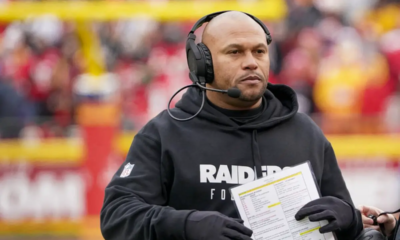The sports world was rocked this week by news that Shohei Ohtani’s longtime interpreter and friend, Ippei Mizuhara, had been fired by the Los Angeles Dodgers.
But Mizuhara’s termination was only the latest sharp turn in a zigzagging, 48-hour journey that played out on two continents as ESPN reporters worked to answer questions about at least $4.5 million in wire transfers sent from Ohtani’s bank account to a bookmaking operation that is under federal investigation. It’s unclear whether that twist will be the las
Two days after the account from Ohtani’s handlers evolved from superstar-bailing-out-his-friend to allegations of “massive theft,” questions remain, including who, if anyone, is investigating the alleged theft. Ohtani’s representatives said Thursday they had officially submitted the allegation to law enforcement but did not say to which authorities.
Multiple sources told ESPN that neither the California Bureau of Investigation nor the FBI was working the case. Spokespersons with the Los Angeles Police Department and district attorney’s offices in Los Angeles and Orange counties all said they were not investigating, and they indicated it was most likely a federal matter. The U.S. Attorney’s Office for the Central District of California declined to comment.
Sources, including Mizuhara, have told ESPN that Ohtani does not gamble and that the funds were transferred to cover Mizuhara’s losses. Multiple sources also said none of the betting was on baseball.
How this came to unfold publicly started with a tip ESPN received several months ago that would be pursued by multiple reporters. Information was gathered over that time frame, but it wasn’t until late Sunday that ESPN had enough confirmation to, for the first time, ask questions to key figures, including Major League Baseball officials, Ohtani representatives, federal law enforcement, the Dodgers and others.
7:30 p.m. ET Sunday (8:30 a.m. Monday in Seoul, South Korea): According to a Major League Baseball source, MLB commissioner Rob Manfred, while in South Korea preparing for the season-opening series between the Dodgers and the San Diego Padres, learns something is happening concerning Ohtani. A source would later say MLB started seeking answers from federal authorities in California early Monday but received no response.
3 p.m. ET Monday (4 a.m. Tuesday in Seoul): ESPN contacts Ohtani’s agent, Nez Balelo, to ask about information it has found, including that Ohtani’s name appeared to be on two wire transfers totaling $1 million. The transfers had been sent in September and October to the Southern California bookmaking operation of Mathew Bowyer. ESPN receives no immediate response.
5:30 p.m. ET Monday (6:30 a.m. Tuesday in Seoul): A crisis-communications spokesman for Ohtani, who had just been hired, responds to ESPN. Over the next several hours, he and an ESPN reporter talk at various times as the spokesman says he is getting up to speed on information from the Ohtani camp.
8:30 p.m. ET Monday (9:30 a.m. Tuesday in Seoul): The spokesman for the first time says Ohtani paid the debts on behalf of Mizuhara. He says Balelo, the agent, went to Mizuhara, who “finally came clean to him and said that was the truth,” and that Ohtani told Balelo he had covered Mizuhara’s debts in $500,000 increments. It’s not clear whether the spokesman is saying Ohtani communicated with Balelo through Mizuhara.
The spokesman quotes Ohtani as saying: “‘Yeah, I sent several large payments. That’s the maximum amount I could send.'”
The ESPN reporter, knowing the spokesman worked for Ohtani, wants to hear it from Mizuhara. The spokesman says he will work on arranging that.
9:05 p.m. ET Tuesday (10:05 a.m. Wednesday in Seoul): The Ohtani spokesman confirms to ESPN that the gambling debt amounted to at least $4.5 million, which ESPN had previously learned from other sources.
10:30 p.m. ET Tuesday (11:30 a.m. Wednesday in Seoul): Mizuhara speaks with an ESPN reporter by phone for 90 minutes from South Korea. The interview has been arranged — and is attended — by the Ohtani spokesman.
Mizuhara tells ESPN he met Bowyer at a poker game in San Diego in 2021. Atlanta Braves infielder David Fletcher, who was friends with Ohtani when they both played for the Los Angeles Angels, had previously told ESPN that he was present at the poker game, but he said he did not introduce the bookie and the interpreter. Fletcher and a source with knowledge of Bowyer’s operation told ESPN that Bowyer gained admittance to the poker game at the team hotel through an acquaintance of Fletcher’s. Fletcher told ESPN he had met Bowyer once before while playing golf, and that he had never placed a bet with Bowyer’s organization.
In the ESPN interview, Mizuhara says he started betting with Bowyer on credit shortly after they met, placing wagers on several sports — but not baseball. He says he had previously bet on DraftKings and didn’t know Bowyer’s operation was illegal. At the time, his salary with the Angels was about $85,000, he says, and by the end of 2022 he had lost over $1 million and was borrowing money from friends and family.
“I couldn’t share this with Shohei. It was hard for me to make my ends meet. I was going paycheck to paycheck,” Mizuhara says. “Because I kind of had to keep up with his lifestyle. But at the same time, I didn’t want to tell him this.”
He describes his relationship with Ohtani, whom he first met in 2013, as “brothers,” and says he spends more time with Ohtani than with his wife.
Mizuhara’s debt ballooned to $4 million by early 2023, he tells ESPN, and that’s when he says he went to Ohtani for help. He says he feared losing Ohtani’s trust, and he also feared for his safety, that someone might come to his house.
“I explained my situation,” he says. “And obviously he wasn’t happy about it, but he said he would help me.”
Asked if Ohtani knew the person owed the money was a bookie, Mizuhara says his friend “didn’t have any clue.”
“I just told him I need to send a wire to pay off the debt,” Mizuhara says. “He didn’t ask if it was illegal, didn’t question me about that.”
Mizuhara says that, after Ohtani agreed to pay the debts, the two of them logged into Ohtani’s bank account on Ohtani’s computer and sent eight or nine transactions, each at $500,000, over several months. They added “loan” to the description field in the transactions. Mizuhara estimates the final payment was made in October.
Asked by ESPN if he thought he would be putting himself or Ohtani at risk by asking Ohtani to pay the debts, Mizuhara says, “I don’t think either of us thought about that at the time at all.”
Mizuhara declines to tell ESPN the full amount he lost gambling but confirms it’s at least $4.5 million. He calls it “embarrassing.”
“My wife doesn’t even know about any of this until even right now,” he says.
He says he felt uncomfortable and guilty for a few weeks after asking Ohtani to pay back his debts, but that Ohtani moved on. “It was hard to see him,” Mizuhara says, “He’s a great guy and pretty much he went on with his life like nothing ever happened.”
Asked if he intended to pay back Ohtani, Mizuhara says he told his friend he would. He adds that Ohtani has never gambled and “thinks gambling is terrible.”
“He sees that people, teammates would be gambling all the time, and he’ll be like, ‘Why are they doing this? Gambling is not good.’ He would make comments like that. People would ask him to go to casinos on road trips, and he would never go. No, he’s not into it.”
6:05 a.m. ET Wednesday (7:05 p.m. in Seoul): The Dodgers open the 2024 season against the Padres, winning 5-2. Ohtani gets two hits and is seen in the dugout laughing with Mizuhara in the final minutes of the game.
9 a.m. ET Wednesday (10 p.m. in Seoul): An MLB source says officials are aware of what Mizuhara told ESPN the previous night — that Ohtani had covered his debts. The source says MLB still has not heard back from federal authorities.
10 a.m. ET Wednesday (11 p.m. in Seoul): After the game, the Dodgers hold a meeting in the clubhouse, where team owner Mark Walter tells the players a negative story is coming, according to a team official later interviewed by ESPN. Mizuhara apologizes, according to the official, and tells the team he has a gambling addiction. A Dodgers executive, Andrew Friedman, stands up and says Ohtani had helped to cover Mizuhara’s losses, the team official and others present said.
On the way back to the hotel, Ohtani starts asking questions about what had been said in the clubhouse, the Ohtani spokesman told ESPN, and his representatives say that’s when Ohtani told them he didn’t recognize Mizuhara’s version of the events. According to the Dodgers official and Ohtani’s spokesman, Ohtani’s representatives had continued to rely on Mizuhara to communicate with Ohtani while they were dealing with the situation, and Mizuhara did not tell Ohtani what was happening.
According to the Ohtani spokesman, Ohtani discovers for the first time Wednesday that money is missing from his account.
11:32 a.m. ET Wednesday (12:32 a.m. Thursday in Seoul): Ohtani’s spokesman advises ESPN not to publish its story. “Ippei was lying,” he says. “Shohei didn’t know.” In a rapid series of phone calls that follow, the spokesman emphasizes that all communication between Ohtani and his agent had gone through Mizuhara.
1:15 p.m. ET Wednesday (2:15 a.m. Thursday in Seoul): Because of the seriousness of that allegation and emerging inconsistencies in the accounts, ESPN demands that Ohtani’s spokesman go on the record with the theft allegations and gives him a 1:45 p.m. deadline. The Ohtani spokesman says Mizuhara is despondent and needs to explain his situation to his family, and that attorneys are preparing a statement. The spokesman promises a statement by 2 p.m.
2 p.m. ET Wednesday (3 a.m. Thursday in Seoul): Ohtani’s lawyers at Berk Brettler LLP issue a statement to ESPN: “In the course of responding to recent media inquiries, we discovered that Shohei has been the victim of a massive theft and we are turning the matter over to the authorities.”
The Ohtani spokesman declines to answer further questions, and the statement does not specify whom they believe perpetrated a theft.
2:30 p.m. ET Wednesday (3:30 a.m. Thursday in Seoul): The Dodgers fire Mizuhara immediately after learning about the alleged theft, according to a team official.
3:55 p.m. ET Wednesday (4:55 a.m. Thursday in Seoul): ESPN reaches Mizuhara by phone. He says he had lied in his previous interview and walks back much of what he had said. He tells ESPN Ohtani had no knowledge of his gambling activities, debts or efforts to repay them.
Asked if he had been accused of theft or embezzlement, he says he has been told not to comment, but he declines to say by whom.
“Obviously, this is all my fault, everything I’ve done,” he says. “I’m ready to face all the consequences.”
When did Ohtani become aware of the situation?
“They told me I can’t answer anything,” he says.
Ohtani’s representatives? Are they representing you?
“No.”
Are you taking any form of payment to tell me these things?
“No.”
Have you made any kind of agreement to say these things?
“No.”
You’re doing this of your own volition and free will?
“Yes.”
Did you bet on baseball?
“No.”
Did you lie to Shohei?
“Yes.”
ESPN asks if he has ever purposely misinformed Ohtani while interpreting the issues the reporter is asking about. Mizuhara says: “No, I have never done that.”
The ESPN reporter texts him with a final question: Did you take the money from Shohei’s accounts without his knowledge?
There is no response.
4:13 p.m. ET Wednesday (5:13 a.m. Thursday in Seoul): The Ohtani spokesman tells ESPN that what has actually happened in recent days is that Mizuhara has been able to control information to Ohtani in his position as the interpreter, and that Ohtani hadn’t realized what was happening until the postgame clubhouse meeting, when a new interpreter was brought in.
“He didn’t know any of it, didn’t know there was some inquiry,” the spokesman says. “After the game, that’s when he found out. … He didn’t know what the f— was going on.”
Tisha Thompson is an investigative reporter for ESPN. Reach her at tisha.thompson@espn.com.


























